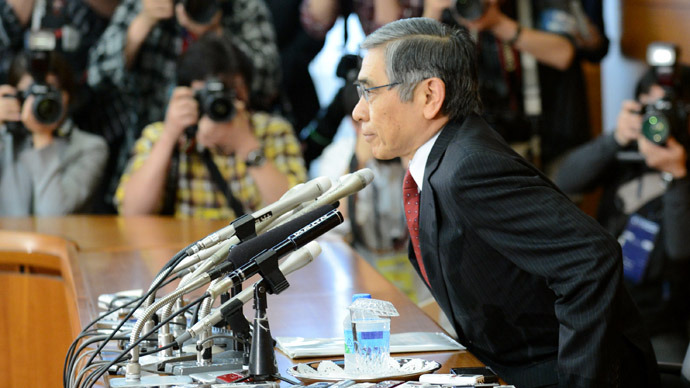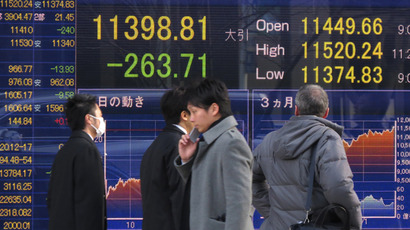Bank of Japan $520bn kickstart to economy

The Bank of Japan shocked markets on Thursday when it announced an aggressive stimulus plan to combat over 20 years of deflation, declaring a ‘new phase of monetary easing both in terms of quantity and quality.’
The bank unveiled its plan to
double government bonds by 50 trillion yen ($520 billion) per year,
or almost 10% of Japan’s total gross domestic product. The bank
will buy 7 trillion yen ($74 billion) of bonds per month, news
which has already sent markets into a frenzy over the already weak
yen.
In reaction, the yen fell 2.5% against the dollar to 95.40 yen, the biggest drop since October 2011, the last time Japan purposely downgraded its currency.
The new policies will “lead Japan’s economy to overcome deflation that has lasted nearly 15 years,” the central bank said in the statement.
Fighting deflation was the first issue new Governor Haruhiko Kuroda tackled at his first central bank meeting, and is a more pugnacious variant of Abenomics, Prime Minister Shinzo Abe’s strategy of weakening the yen to boost Japan’s export appeal.
"The previous approach of incremental easing wasn't enough to pull Japan out of deflation and achieve 2% inflation in two years," said Mr. Kuroda
Inflate or Default
After the record decline against the dollar in the past 17 months, the yen has quickly dropped 10% under Abe’s 3 month tenure, a Japan is purposely propping up its currency.
“The Bank of Japan has woken up to the fact that it has only two options left: inflate or default,” Jeremy Batstone-Carr, head of research at Charles Stanley Group, told Bloomberg in an interview.
“Given that default will result in a collapse, the only choice is to inflate,” said Bastone-Carr.
Japan needs a cheaper currency to increase its exports, which in February was reported at a $8.1 billion, and a 7-month deficit, the longest sting since 1980. The cheap currency will raise inflation, because if the yen falls, import prices will increase and deflation will continue its detrimental trajectory.
The first step is to get out of deflation and get a much higher nominal growth rate," said a senior democratic lawmaker.
The Bank of Japan has temporarily suspended its ‘banknote rule’, a bank policy that aims at keep the value of bond holdings below the amount of cash in circulation, in order to pump more money into the economy.
Markets respond positively, but analysts doubt the overhaul plan
The Bank of Japan’s decision sent the Nikkei 225 soaring by 2.2% to 12,634.54, an indication the Japanese market is already reacting positively to the bank’s policy.
Mitsubishi Financial group, Japan’s largest lender, has advanced 5.5% upon the news.
German stocks also advanced on the stimulus news, the DAX Index is up 0.6 percent to 7,924.3 at 14:03 in Frankfurt, recovering from yesterday’s 0.9 percent drop.
"Achieving 2% inflation in two years remains quite difficult. But the possibility of that target being achieved is now much higher than before with these measures," said Yoshimasa Maruyama, chief economist as Itochu Economic Research Institute.
Other analysts aren’t so taken with the proposal.
"It's Mission Impossible and Mr. Kuroda isn't Tom Cruise," said JP Morgan’s chief economist in Tokyo, Massaki Kanno.














